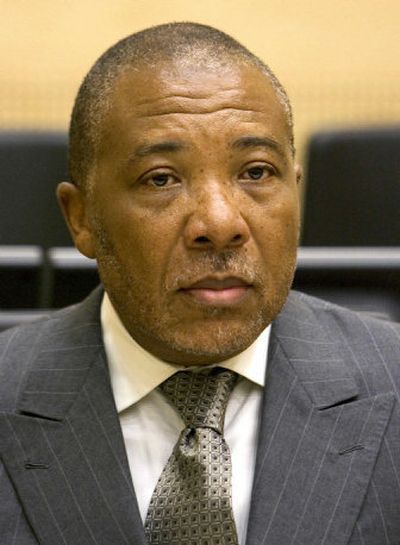War crimes trial begins for ex-Liberian leader

THE HAGUE, Netherlands – The war crimes trial of former Liberian President Charles Taylor began Monday with a catalog of horrors, as prosecutors at a U.N.-backed court here accused him of subjecting tens of thousands of civilians to a campaign of murder, sexual abuse, amputation and slave labor.
Unleashing rampaging guerrillas and child soldiers in neighboring Sierra Leone, Taylor oversaw atrocities that displayed “the very worst humans are capable of doing to one another,” prosecutor Stephen Rapp said in his opening statement.
Taylor, who refused to appear in court Monday, is charged with crimes against humanity by the Special Court for Sierra Leone, a tribunal created by the U.N. to seek justice for a desperately poor country that endured mayhem between 1996 and 2002 when Taylor was an emblematic regional despot.
Taylor, 59, sent word that he would not be in court because he had been denied adequate time and resources to prepare his defense since his arrest last year. Taylor announced in a letter read by his lawyer, Karim Khan, that he had dismissed Khan and planned to represent himself.
The announcement set off an increasingly heated exchange between Khan and the presiding judge, Julia Sebutinde, of Uganda. Khan’s attempts at a dramatic departure were blocked by admonitions from Sebutinde, who warned that he was on the verge of contempt of court.
Finally, the three-judge panel allowed Khan to leave, and a junior defense attorney remained to represent the imprisoned former warlord.
Procedural issues and political maneuvering did not detract from the sweep of the case against Taylor laid out Monday. Rapp described how Taylor’s bloody rise to power in a civil war in Liberia, where he was ultimately elected president in 1997, interwove with his close alliance with the rebels of the Revolutionary United Force (RUF) in Sierra Leone.
Although Taylor is being charged only with crimes in Sierra Leone, prosecutors argue his tactics in Liberia foreshadowed the pattern of atrocities for which he is now on trial. The terror in Sierra Leone often was carried out by ruthless, bizarrely attired child soldiers who were conscripted forcibly and plied with drugs. Prosecutors allege that phenomenon originated with Taylor’s development of child fighters in Liberia, where he created “Small Boys Units” and “Small Girls Units” that served as loyal and brutal security teams.
Rapp alleged that Taylor entered into a “joint criminal enterprise” with Foday Sankoh and other Sierra Leone rebel leaders to terrorize civilians. Taylor trained, armed and controlled the rebels, prosecutors said, citing the use of go-betweens, meetings, letters, weapons and diamonds shipments and other evidence to show Taylor’s direct involvement in and knowledge of crimes in the neighboring country.
The horrors mounted in 1996 and 1997, Rapp charged, when the Taylor-backed rebels escalated the slaughter and looting of entire villages, forced women and girls into sexual slavery and engaged in systematic amputations as they taunted victims to ask their president for new limbs.
The rebels focused their marauding on the country’s diamond fields, funding a rogue governing junta that needed cash because it was denied aid by the international community. As a result, atrocities were said to be centered in places such as the diamond-rich Kono district, where civilian slaves were forced to mine and transport diamonds that allegedly enriched Taylor, who is receiving court-funded legal services because he claims to be indigent.
Taylor eventually was overthrown by rivals in Liberia. He went into exile in Nigeria in 2003 soon after the international charges were filed.
Before fleeing, he ordered the bloody assassinations of several former henchmen to prevent them from talking, prosecutors alleged.